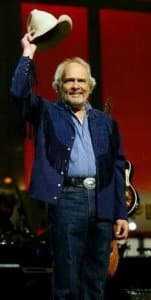
A shadow of a long-lost love, a ghost of a memory walking the dusty plains of Oklahoma—this is the raw, unspoken truth behind one of country music’s most enduring anthems. For decades, millions have sung along, their own heartaches echoing in the notes of Merle Haggard’s legendary ballad, “Today I Started Loving You Again.” But a deeper, more personal story of a love that refused to die is buried just beneath the surface, a story that began with a fateful trip back home.
The year was 1968. While the world was in turmoil, Haggard was fighting a private battle with his own past. A visit to his hometown was supposed to be a simple return, but it uncorked a torrent of feelings he thought were long gone. Every corner, every familiar face, sparked a memory of a past love, reigniting the embers of an affection that time had failed to extinguish. It was in this crucible of memory and regret that the song was born.
“He never truly let her go,” a source close to the Haggard camp revealed in a hushed tone. “That trip back to Oklahoma wasn’t just a visit; it was a pilgrimage into his own heart. He saw a picture, a ghost from his past, and the dam just broke. He confessed to me once, ‘That song wasn’t written with a pen; it was written with every piece of my heart that I’d left behind.’ It was a rekindled love that haunted him and gave us a masterpiece.”
The lyrics, so simple yet so devastatingly potent, tell the tale: “I saw your picture yesterday / It brought back memories / And today I started loving you again.” It’s a universal feeling, a shared human experience of seeing an old photograph or hearing a forgotten tune and being instantly transported back to a time of intense passion and profound connection. For the generation that grew up with Haggard, these words were a mirror to their own souls.
The music itself, the iconic Bakersfield sound, is not just a style; it’s the heartbeat of the story. The driving shuffle beat pushes forward, relentlessly, like the flood of memories returning, impossible to stop. Haggard’s weathered, brutally honest voice doesn’t just sing the lyrics; it testifies to their truth, a sincerity that resonates with anyone who has ever dared to love, lose, and then, unexpectedly, feel that love bloom once more. The song stormed the Billboard charts and earned him his first Grammy nomination, cementing its place in history not just as a hit, but as a public confession of a love that would never fade.